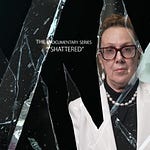A few weeks ago, I received an email from Jo Muirhead. The subject line?
“Oh my God—it’s the system!” … “I realised it was the system, not me.”
That’s not the kind of message you ignore. Especially not from someone like Jo, who has almost 30 years’ experience in allied health, rehabilitation, and coaching. She’s one of those people whose life’s work has been about helping others heal. But what happens when the system that’s meant to support healing starts harming the very people working in it?
That’s the conversation we had recently and it was honest, raw, and long overdue.
“We were never taught how to live with injury.”
Jo said something early on in our chat that really stuck with me:
“We go to university and learn a lot about injury and disability,
but we never learn what it is to live with injury and disability.”
For so many health professionals, the reality of work doesn’t line up with the textbook version. There’s a constant clash between what they know is right and what the system allows them to do. That conflict that values dissonance isn’t just exhausting, it’s damaging. And it has a name.
It’s Not Burnout—It’s Moral Injury
Jo knows burnout well. She’s researched it, lived it, even wrote a book on it in 2017. But something still wasn’t sitting right.
“I still felt like I was the problem. Like I wasn’t doing enough.”
Then she saw our training on moral injury, the psychological distress experienced when your values are repeatedly violated by systems you work in. That was Jo’s lightbulb moment.
“I watched the training and I went: It’s not me.
I’m not incompetent. I’ve been operating in a system that makes it impossible to succeed ethically.”
Let that sink in. Because Jo is not alone in this.
A System That Demands “Do More With Less”
Rehabilitation professionals are told to follow best-practice, evidence-based healthcare but then face funding decisions that make that impossible.
“We’re given responsibility without authority. We write pages of reports that no one reads,
and then see that information misused in ways that hurt our clients.”
She described how one report intended to help a client was instead used to cut off their benefits without warning. A young practitioner, fresh out of university, was suddenly on the receiving end of abuse and threats. Not because she’d done anything wrong—but because the system used her work for its own outcomes.
Supervision Isn’t Optional. It’s Oxygen.
Jo got through it. But only just. And her advice for those still in it is clear:
“Use supervision and peer support like oxygen.
Not compliance checklists, real supervision that lets you say:
‘This is hard. I’m struggling.’”
If she had her time again? She’d have started supervision from day one.
Not to tick a box. But to stay human in an inhumane system.
“We Can’t Be Heroes Anymore.”
Jo had one more truth bomb to drop.
“We need to stop trying to be heroes. We can’t fix the system.
Our job is to help the person in front of us, get them to the next step.
Empower them, then let them go.”
That, she says, is enough. That’s the real work.
And it’s the antidote to moral injury: staying grounded in dignity and respect even when the system doesn’t.
So What Now?
It’s time to stop blaming ourselves for a broken system.
It’s time to come together—health professionals, injured workers, advocates—and start talking out loud about what’s really going on.
Because if we don’t?
We risk losing more than our health professionals.
We risk losing the heart of healthcare itself.
5 Takeaways from Jo Muirhead
🛠️ for health professionals and those who support them:
Understand the rules – Know the legislation, even if you didn’t write it.
Anchor in your values – For Jo, that’s dignity and respect. Find yours.
You are not the system – Don’t internalise what’s outside your control.
Stop wearing the superhero cape – Help, don’t save.
Supervision is a must – And not the punitive kind. The human kind.

















Share this post